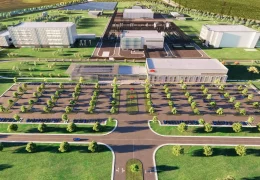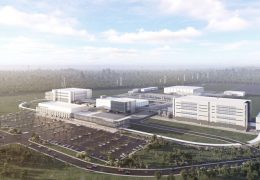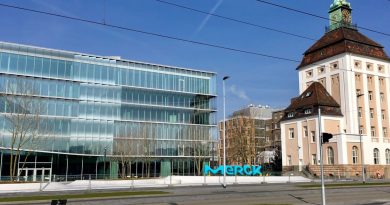BioNTech Boosts Autonomy with In-House Plasmid DNA Manufacturing Facility in Marburg
The construction of BioNTech’s first in-house plasmid DNA processing plant in Marburg, Germany, has now been completed, the company announced at the beginning of the month. For mRNA-based vaccines and cell-based therapeutics production, plasmid DNA is an essential starting component.
The new plasmid manufacturing facility is intended to boost BioNTech’s capabilities in producing an essential ingredient for its COVID-19 vaccine, and cancer pipeline autonomously.
The roughly €40 million investment is a cornerstone in the long-term expansion strategy, of BioNTech’s Marburg manufacturing facility. The plant was visited by German Chancellor Olaf Scholz and co-founders of BioNTech Prof. Ugur Sahin, Chief Executive Officer, and Prof. Özlem Türeci, Chief Medical Officer on February 2, 2023.
Independent and self-sufficient production of plasmid DNA
With the newly established site, BioNTech intends to launch independent and self-sufficient production of plasmid DNA for commercial products and clinical therapy candidates in the fields of cancer and infectious illnesses. On on February 2, 2023, German Chancellor Olaf Scholz and BioNTech co-founders Prof. Ugur Sahin, M.D., Chief Executive Officer, and Prof. Özlem Türeci, M.D., Chief Medical Officer, visited the company’s new Marburg production plant.
Once the new production facility is operational and subject to regulatory permissions, BioNTech aims to autonomously manufacture the bulk of its own existing regular demand for DNA plasmids there. Partner suppliers will continue to provide coverage for demand peaks. With local production, this aims to strengthen BioNTech’s versatility and autonomy in producing the key ingredients for its cancer therapy and COVID-19 vaccine pipelines as well as the Company’s independence for pandemic preparedness.
Furthermore, the company also anticipates that at the new manufacturing site, the production cycles and the logistics of plasmid DNA would be more efficient and quicker for a variety of clinical therapy candidates and commercial products.
Olaf Scholz, Chancellor of the Federal Republic of Germany commented:
“Medical biotechnology is a key technology of the 21st century. The pandemic has proven Germany’s capability as a location for innovation and manufacturing of medicines. Germany and Europe are becoming more resilient by building local value chains. BioNTech’s investment is very good news.”
Prof. Ugur Sahin, M.D., Chief Executive Officer and Co-Founder of BioNTech, said:
“Since we acquired our manufacturing site in Marburg in the fall of 2020, we have continuously invested in the site to expand our manufacturing capacities and capabilities. Plasmid manufacturing is an exciting and important part of mRNA manufacturing that we expect to be able to cover in-house soon.”
“We plan to manufacture mRNA-based products for a broad range of clinical trial candidates at our Marburg site while we are preparing production measures for the commercial manufacturing of personalized oncology therapeutics.”
The brand-new production site consists of two facilities for both commercial and clinical (small- and large-scale) plasmid DNA production. Since August 2022, the clinical-scale factory has been in operation. BioNTech is now producing plasmids at this facility for the Company’s FixVac platform product candidates, namely BNT111.
Local production of key ingredients for mRNA- and cell-based medication
Depending on the product or drug candidate, BioNTech anticipates producing plasmid DNA that may be used as a starting point to produce mRNA for several hundred million vaccine doses or therapeutic treatments per year. Subject to regulatory approval, it is projected that the commercial facility will be operating by the end of 2023. The new production plant is expected to need a total expenditure from BioNTech of about €40 million.
The BioNTech Marburg plant is one of the biggest mRNA-based vaccine manufacturing facilities in Europe. As part of its long-term development plan, BioNTech has constantly made investments in the area, and over the past two years, the company’s staff has more than doubled to over 700. Three other possible growth areas are included in the development plan in addition to the Pfizer-BioNTech COVID-19 vaccine’s commercial manufacturing, which is already well-established:
A center of technology for cutting-edge manufacturing methods like the BioNTainer, which has the first two fully functional modular production facilities on-site. Clinical-scale mRNA vaccine production in support of the company’s clinical trials. At this time, the company’s exclusive FixVac platform’s candidates are the main emphasis.
Key ingredients for mRNA- and cell-based medication production will be produced locally using in-house plasmid DNA manufacture.
It is intended for the Marburg-produced plasmid DNA to be used globally and to serve as the core component for the manufacture of mRNA- and cell-based products on a clinical or commercial scale. The BioNTech research pipeline currently has 26 clinical trials testing 22 product candidates. The business is carrying out clinical investigations across more than 30 countries, with the majority of them taking place in Germany, Spain, Belgium, the United Kingdom, and the United States.
About Plasmid DNA
In addition to their genomic DNA, bacteria can also include tiny, ring-shaped DNA sequences called plasmids. They frequently encode newly acquired genetic information, such as genes that might give a bacteria resistance to antibiotics. Plasmids are utilized in the biopharmaceutical sector as vectors or transporters for, among other things, the replication of DNA sequences or genetic information.
More than 500 mRNA strands can be produced from a copy of a DNA sequence that has been taken from a plasmid. The DNA templates are screened and removed after mRNA production, so they do not end up in the vaccines or treatments that are manufactured eventually.
Latest Projects
- Eli Lilly to Invest $6 Billion in New API Manufacturing Facility in Alabama, USA
 The new Huntsville, Alabama site will produce small molecule and peptide medicines, including oral GLP-1 orforglipron Eli Lilly and Company
The new Huntsville, Alabama site will produce small molecule and peptide medicines, including oral GLP-1 orforglipron Eli Lilly and Company - Eli Lilly’s Next-gen $6.5B API and GLP-1 Orforglipron Facility, Houston, Texas, USA
 Eli Lilly and Company has announced plans to build a $6.5 billion next-generation active pharmaceutical ingredient (API) manufacturing facility at
Eli Lilly and Company has announced plans to build a $6.5 billion next-generation active pharmaceutical ingredient (API) manufacturing facility at - AstraZeneca Unveils $300 Million Cell Therapy Manufacturing Facility in Rockville, USA
 Global biopharmaceutical leader AstraZeneca has officially opened a new $300 million state-of-the-art cell therapy manufacturing facility in Rockville, Maryland, marking
Global biopharmaceutical leader AstraZeneca has officially opened a new $300 million state-of-the-art cell therapy manufacturing facility in Rockville, Maryland, marking - Roche to Invest $50B in US Pharma Expansion Set To Flip Trade Deficit
 In a transformative move for the U.S. healthcare manufacturing sector, Roche unveiled plans to invest $50 billion in American pharmaceutical
In a transformative move for the U.S. healthcare manufacturing sector, Roche unveiled plans to invest $50 billion in American pharmaceutical - MSD Acquires WuXi Vaccines Facility in Dundalk for €500m
 In a significant acquisition move, pharmaceutical giant MSD has agreed to acquire the WuXi Vaccines manufacturing facility in Dundalk, Ireland.
In a significant acquisition move, pharmaceutical giant MSD has agreed to acquire the WuXi Vaccines manufacturing facility in Dundalk, Ireland. - Infrareal to Take Over Takeda’s Gene and Cell Therapy Site in Orth, Austria
 Infrareal Holding plans to take over Takeda’s pharma and biotech site specialising in gene and cell therapies in Orth, Lower
Infrareal Holding plans to take over Takeda’s pharma and biotech site specialising in gene and cell therapies in Orth, Lower





